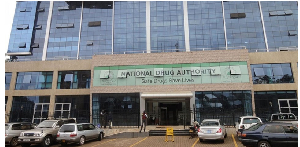 The headquarters of the Ministry of Science, Technology and Innovations in Kampala
The headquarters of the Ministry of Science, Technology and Innovations in Kampala
Kenya’s Pharmacy and Poisons Board (PPB) and Uganda’s National Drug Authority have uncovered a disturbing network of illicit medical products being shipped into both countries via postal and air cargo channels.
The seized items, which include human medicines, biologic products, and dietary supplements, pose significant health risks to the public and highlight the growing challenge of regulating cross-border pharmaceutical trade.
In the course of the operation, the team found medicines that had been stored and shipped outside of approved conditions; prescription medicines lacking valid prescriptions and not declared to avoid detection; and dietary supplements known to contain undeclared active pharmaceutical ingredients imported in violation of domestic regulations.
In a joint press statement, the two institutions stated that they partnered with an enforcement team to conduct a joint operation called Operation African Star, which is aimed at improving health and disrupting the illicit trade in health products, pharmaceutical preparations, medical devices, and equipment across Africa.
The enforcement team included agencies from both Kenya and Uganda, the United States, the United Kingdom, and the European Union, as well as multinational organisations and the regulated pharmaceutical industry.
Dr Fred Siyoi, chief executive officer of PPB, warned that health products and technologies obtained outside of the regulated supply chain risk public and consumer health.
“The threat posed by illicit trade in health products and technologies impacts global public health and consumers. This risk increases when health products and technologies are obtained outside of the regulated supply chain. Safety and efficacy, which cannot be assured, threaten the East African Community and public health at large.
“Individuals who purchase prescription medicines from unauthorised sources may be putting their health at risk because these medicines may be falsified, substandard, expired, or otherwise unsafe for use; as many of these products are used to treat serious or life-threatening medical conditions,” he warned.
He explained that the operation was triggered by concerns that the small parcels passing through Kenya's postal and courier services might contain restricted or controlled substances or require the Boards' authorisation.
The first phase of the operation was conducted between June 11 and 12, with the second phase in Uganda on June 14 and 15.
"From the Kenyan postal and courier services, no huge consignments were noted apart from parcels intercepted and seized at Jomo Kenyatta International Airport via DHL, for verifications due to the unavailability of requisite PPB documentation. They include fiatro; semaglutide injection 24vials, kidney tonifying capsules 120tabs, lexotanil 1.5mg tabs 30, green nature herbals 60 tins, male restoration 60 tins," said Dr. Siyoi.
"No suspects were caught, though investigations touching on the consignments are ongoing. The captured shipments are under seizure through PPB seizure documents and deposited in customs storage units pending disposal," said Dr Siyoi.
"Additional research is necessary to quantify the extent of illicit trade, especially since the Board has adopted a multi-agency approach. A memorandum of understanding has been signed with relevant authorities such as the Anti-Counterfeit Authority to investigate the scope of illicit trade," he noted.
A doctor who did not want to be named as he is not authorised to address the media explained that most of the seized drugs are supplements and not subject to control. He explained that most people have been advised against taking the drugs because they have not been standardised.
Assistant Commissioner for Criminal Investigations for the United States Food and Drug Administration Justin Green explained that due to the increased accessibility of medicines in the global supply chain, countries are finding it challenging to identify illicit products and hold bad actors accountable.
"The FDA greatly appreciates the opportunity to work with Kenyan, Ugandan, and other key international partners to bring focus to global public health threat, and it values the implementation of a pioneering initiative to combat it," he said.
According to Kennedy Mutai, a pharmacist at Avenue Hospital Parklands, improper storage such as hot temperatures or humidity alters how medications work by making them lose potency and interferes with treatment, leading to relapse in patients.
“If antibiotics decay due to poor storage, they will pose a negative effect to the body. Diagnostic products such as blood sugar tests are sensitive to humidity and leads to false results,” he says.
“Some products like vaccines and insulins are protein in nature and exposure to heat will render them useless. When exposed to heat, some products like creams and ointments will make their ingredients separate, making the drug not to function well,” he adds.
He also explains that for the sake of regulation, all drug-active ingredients should be declared to aid in determining their contents before they are released to the market.
“This is because one won't be able to know the expected side effects of such drugs if their active ingredients are not known. Various drugs might interact when taken together and since their active ingredients are not known, this will lead to serious drug adverse interactions, which are harmful to one’s health,” he says.
“You also won't be able to determine the dosage of a drug when administering if their specific contents are not known. This will also interfere with treatment,” he adds.
According to PPB, efforts are underway to alert consumers of the dangers associated with illicit medicines, as well as enforcement actions.